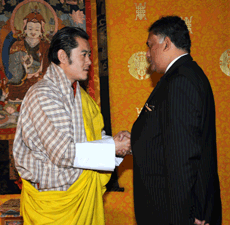SMITHSONIAN FESTIVAL 3 July, 2008 - "So much of Bhutanese culture in such a small space … the spirit, warmth, faith, music, dance … just look at the wonder on the faces of the American people … It is going to leave a deep impression …”
This was Congressman Brian Baird, who visited the Bhutan exhibition on the Washington Mall where, he said, “the nation gathers every year”.
As thousands of people crowded the Bhutan exhibition to look at a culture that was difficult for them to fathom, however, the Bhutanese participants were equally fascinated by the American people and their country.
“I can’t imagine, even after seeing them, that there are so many different types of people on this earth,” said a Bhutanese swordmaker, looking at the crowd of people of all shapes, sizes, and colours. And, in the heat of Washington’s notoriously hot and humid summer, the Bhutanese find the clothing and lack of clothing of the Americans equally astonishing.
Meanwhile, a Laya herder is still in a daze after the amazing 17-hour flight from Delhi which he found to be an ethereal experience. “I think this is how the deities live,” he said. “It’s so still up in the sky. And they bring you food and drink, serving it up to your chin. I chanted my prayers because I think they would have more merit up there.” He also watched every movie on the menu without understanding a word.
A sculptor is equally amazed by a train that travels under the ground. He did not dare step on a long flight of steps that moved on its own but thoroughly enjoyed the ride on the subway that “moved like an arrow”. The group of Bhutanese artisans stood there in surprise when a guide bought them tickets from a vending machine. “She put in the money and out came the tickets,” said a weaver. “Not only that, the right change also came out. At home, even humans sometimes give you the wrong change.”
“I wonder how this machine calculates and what it usually thinks about,” remarked a RAPA singer.
A carpenter saw the Atlantic Ocean and he cannot comprehend its vastness. When he saw it from the aircraft he did not know what it was. Looking at it from the beach he was at a loss for words. His friend prefers the zoo. He thought that all animals lived in the forest but he came across the entire range of the animal world in the Washington Zoo, close up.
The eight-lane traffic, busy sidewalks, and lights that automatically direct vehicle movement are another world, too fast to be understood. Policemen and women, with guns hanging at the waist, conjure pictures from television, that is, for those who have watched television.
A majority of the Bhutanese visitors are too frightened to explore the capital of the United States. “We could get lost in a second,” says a blacksmith. “I don’t think I can trust anyone to take me around. If we get lost, we can’t be found here.”
A mask dancer was impressed by a mechanised 350-acre farm, complete with a multimillion-dollar farmhouse and manicured grounds. It had a scene where even the monks, all equipped with brand new cameras, were clicking in all directions.
As numerous well-wishers and friends of Bhutan, as well as Bhutanese, from all corners of the United States continue to drop by the tents, there are nostalgic scenes. The American visitors are generally interested and questioning. They are also physically expressive and Bhutanese participants are being hugged and kissed more than they have ever been before.
But a resounding impression on all Bhutanese participants is the discipline among the crowds of people, particularly the absence of garbage in public space. Most of them are contrasting this with Bhutanese towns and spaces that are covered by litter. This difference in civic sense has struck every member of the Bhutanese team in Washington. “If we all take our own garbage with us, our streets will be clean,” said a silversmith.
It has also dawned on the delegation that, if every motorist follows the rules, traffic will be smooth.
Juxtapose all these scenes into an experience and it is like a dream. According to American observers, the Bhutanese participants are open and confident and very responsive to strangers. Meanwhile, a resolution has been introduced in the House of Representatives of the U.S. government to commemorate Bhutan’s participation in the festival, to recognize the country’s cultural, artistic, agricultural, and environment achievements, to commend the commitment to change, and to remain committed to working with Bhutan.
www.bbs.com.bt









